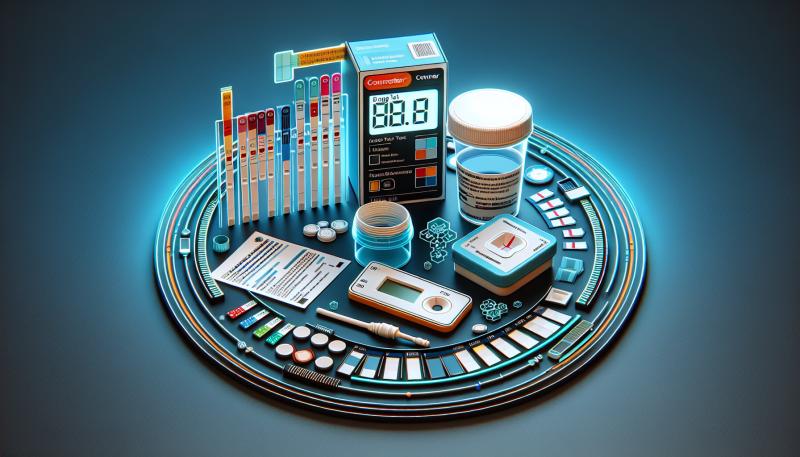
Over-the-Counter Drug Tests: How Accurate Are They?
In recent years, the availability and popularity of over-the-counter (OTC) drug tests have significantly increased. As more consumers seek convenient solutions to test for the presence of drugs at home or within small business environments, questions about their reliability and accuracy emerge. This article explores the varying accuracy of these drug tests, offering insights to help consumers make informed decisions.
What Are Over-the-Counter Drug Tests?
Over-the-counter drug tests are kits available at pharmacies, online stores, and retail outlets. These tests allow individuals to screen for drugs in urine, saliva, hair, or blood without needing a prescription. While many rely on them for personal use, they are also used by employers and educational institutions for preliminary screenings.
Types of Over-the-Counter Drug Tests
There are several types of OTC drug tests based on the sample they analyze:
- Urine Tests: The most common and usually the most affordable, these tests can detect drug metabolites for up to a few days after usage.
- Saliva Tests: Often used for more recent drug use, these tests can detect substances consumed in the last few hours to a couple of days.
- Hair Tests: Capable of detecting drug use over the past 90 days, these tests provide a longer-term view of substance use.
- Blood Tests: While blood tests are generally more accurate, they are less commonly available OTC due to the need for invasive sample collection.
Accuracy of OTC Drug Tests
The accuracy of over-the-counter drug tests depends on several factors, including the type of drug, the quality of the test, and proper usage. Understanding these factors helps consumers gauge their reliability.
Factors Influencing Accuracy
- Test Sensitivity: Sensitivity refers to a test's ability to detect even the slightest presence of a drug. More sensitive tests are more likely to detect drug use but may also produce false positives.
- Specificity: Specificity is about the test's ability to distinguish between different substances. A test with high specificity is less likely to confuse one drug for another but may miss some drug detections.
- Sample Quality: The accuracy is also determined by the quality of the sample collected. Improper handling or contamination of samples can result in inaccurate results.
- User Error: Misreading instructions or mishandling the test can affect outcomes. It is crucial to strictly follow the instructions provided with the kit.
Common Drugs Screened and Detection Windows
Most OTC drug tests screen for common substances such as:
- Marijuana (THC): Detectable in urine for a few days to several weeks for chronic users, and in saliva for up to 24 hours.
- Cocaine: Usually detectable in urine for up to four days and in saliva up to 48 hours.
- Opiates: Generally found in urine for up to three days.
- Methamphetamine: Detectable in urine for about three to six days, depending on frequency of use.
- Barbiturates: Can be detected in urine for about two to four days.
Advantages of OTC Drug Tests
Over-the-counter drug tests offer multiple benefits, making them a popular choice among individuals and organizations:
- Convenience: Available without a prescription, these tests can be purchased and used at home or in office settings.
- Affordability: Generally less expensive than lab-based testing, they provide a cost-effective preliminary assessment.
- Privacy: Allows individuals to perform tests in private, with no need to involve a third-party healthcare provider.
- Immediate Results: Results are typically available within minutes, offering prompt insight.
Limitations of OTC Drug Tests
Despite their advantages, OTC drug tests are not without limitations:
- False Positives/Negatives: Possible due to cross-reactivity with other medications or improper test administration.
- Limited Test Panels: May not detect all drug types or newer synthetic drugs.
- No Quantitative Data: OTC tests can indicate presence but do not quantify drug levels.
Improving the Accuracy of OTC Drug Tests
To improve the reliability of results, consider the following steps:
- Choosing a Reputable Brand: Opt for brands such as IMS Screening Solutions that are known for quality and reliability.
- Confirm Positive Results: Consider verifying positive results with laboratory testing for accuracy.
- Read Instructions Thoroughly: Ensure proper understanding and follow the steps accurately to avoid errors.
- Check Expiration Date: Always check and adhere to the expiration date on the kit for valid results.
Conclusion
Over-the-counter drug tests present an accessible and efficient option for preliminary drug screening. While generally offering accurate results, they may be influenced by several factors, including sample quality and test design. For those seeking quick insight into drug use, OTC drug tests can be an effective tool, but follow-up with a professional laboratory test is advisable for confirmed positive results. By understanding the limitations and proper use of these tests, individuals can better trust their outcomes and utilize these tools effectively.
